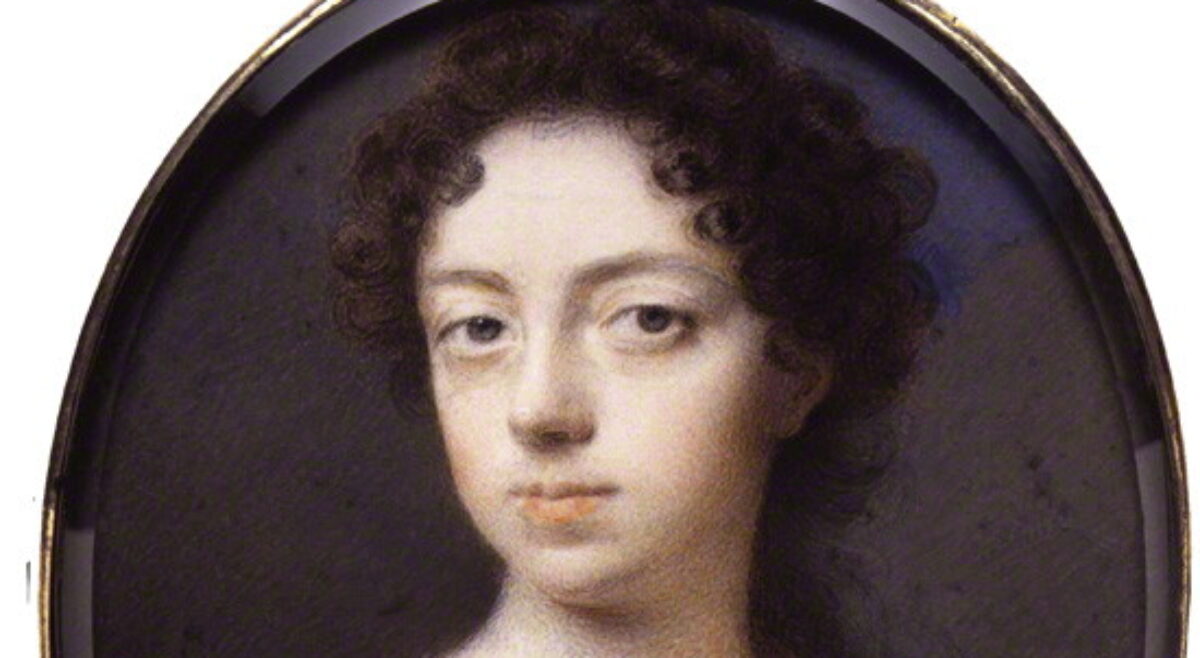1.
One Day the Am’rous Lisander,
By an impatient passion sway’d,
Surpriz’d Fair Cloris, that lov’d Maid,
Who cou’d defend her self no longer;
All things did with his love conspire,
The guilded Planet of the Day,
In his gay Charriot, drawn by Fire,
Was now desending to the Sea,
And left no light to guide the World,
But what from Cloris brighter Eyes was hurl’d
2.
In a lone Thicket, made for love,
Silent, as yeelding Maids consent,
She with a charming languishment,
Permits his force; yet gently strove;
Her hands, his Bosome, softly meet,
But not to put him back design’d,
Rather to draw him on inclin’d,
Whilst he lay trembling at her Feet;
Resistance, ’tis too late to shew,
She wants the pow’r to say—Ah! what d’you do?
3.
Her bright Eyes sweet, and yet severe,
Wher Love, and shame, confus’dly strive,
Fresh vigor, to Lisander give;
And whisp’ring softly in his Ear,
She cry’d—cease—cease—your vain desire,
Or I’ll call out what wou’d you doe?
My dearer Honor, ev’n to you,
I cannot—must not give—retire,
Or take that life, whose chiefest part,
I gave you with the Conquest of my Heart.
4
But he, as much unus’d to fear,
As he was capable of Love,
The blessed Minutes to improve,
Kisses her Lips, her Neck, her Hair!
Each touch! her new desires Allarmes!
His burning trembling Hand he prest,
Upon her melting Snowy Breast,
While he lay panting in his Armes!
All her ungarded Beauties lye,
The spoiles, and Trophies, of the Enemy,
4
And now without respect, or fear,
He seeks the Object of his Vows.
His love no modesty allows.
By swift degrees, advancing where.
His daring Hand that Altar seiz’d,
Where Gods of Love, do Sacrifice!
That awful Throne! that Paradice!
Where Rage is tam’d, and Anger pleas’d?
That living Fountain, from whose Trills,
The melted Soul, in liquid drops destils!
6.
Her Balmey Lips, encountring his,
Their Bodies, as their Souls they joyn’d,
Where both in transports unconfin’d,
Extend themselves upon the Moss!
Cloris, half dead, and breathless lay,
Her Eyes appear’d like Humid light,
Such as divides the Day, and Night,
Or falling Stars, whose Fires decay;
And now no signs of life she shows,
But what in short-breath’d sighs, returns and goes.
7.
He saw how at her length she lay,
He saw her rising Bosome bare;
Her loose thin Robes, through which appear,
A shape design’d, for love, and play
Abandon’d by her Pride, and shame:
She does her softest sweets dispence,
Off ring her Virgin, innocence,
A Victim, to Loves sacred flame.
Whilst th’ o’re ravisht Shepherd, lyes,
Unable to perform the Sacrifice.
8
Ready to tast a Thousand joys,
The too transported hapless Swayne,
Found the vast pleasure, tur’d to rain:
Pleasure! which too much love destroys!
The willing Garment by he laid,
And Heav’n all open to his view.
Mad to possess, himself he threw,
On the defenceless lovely Maid!
But oh! what enviours Gods conspire!
To snach his pow’r, yet leave him the desire!
9.
Natures support, without whose Aid,
She can no humane being give;
It self now wants the Art to live;
Faintness, its slacken’d Nerves Invade,
In vain th’ enraged Youth assay’d,
To call his fleeting Vigor back;
No motion, ’twill from motion take,
Excess of love, his love betray’d,
In vain he toyles, in vain commands.
Th’ Insensible, fell weeping in his Hands.
10.
In this so Am’rous cruel strife,
Where Love, ond Fate, were too severe.
The poor Lisander, in despair,
Renounc’d his Reason, with his life.
Now all the brisk, and Active fire,
That shou’d the nobler part in flame,
And left no spark for new desire;
Not all her naked Charmes cou’d move,
Or calme that Rage, that had debauch’d his love.
11.
Cloris, returning from the Trance,
Which love and soft desire, had bred,
Her tim’rous hand, she gently laid,
Or guided by design, or chance
Upon that Fabulous Priapus,
That Potent God (as Poets feign)
But never did young Shepherdess,
(Gath’ring of Fern, upon the Plain)
More nimbly draw her Fingers back,
Finding beneath the Verdent Leaves a Snake;
12.
Then Cloris, her fair hand withdrew,
Finding that God, of her defiers,
Disarm’d of all his pow’rful Fires;
And cold as Flow’rs bath’d in the Morning Dew;
Who can the Nymphs confusion guess?
The blood forsook the kinder place,
And strew’d with blushes all her Face,
Which both disdain, and shame express;
And from Lisanders Armes she fled,
Leaving him fainting, on the gloomy Bed.
13.
Like Lightning, through the Grove, she hyes,
Or Daphne, from the Delphick God;
No print upon the Grassy Rcad,
She leaves, t’instruct pursuing Eyes;
The Wind, that wanton’d in her Hair,
And with her ruffled Garments plaid,
Discover’d in the flying Maid;
All that the Gods e’re made of Fair.
So Venus, when her Love, was slain,
With fear, and hast, flew o’re the Fatal Plain,
14.
The Nymphs resentments, none but I,
Can well imagine, and Condole;
But none can guess Lisanders, Soul,
But those who sway’d his Distiny:
His silent griefs, swell up to Storms,
And not one God, his fury spares,
He curst his Berth, his Fate, his Stars,
But more the Sheherdesses Charmes;
Whose soft bewitching influence,
Had damn’d him to the Hell, of Impotence.


